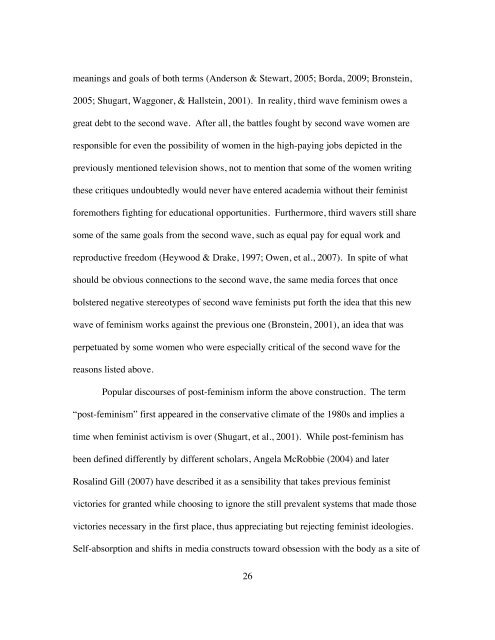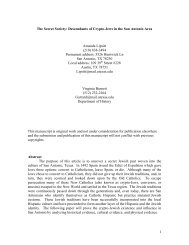Gender, Feminism, and Heroism in Joss Whedon and John ...
Gender, Feminism, and Heroism in Joss Whedon and John ...
Gender, Feminism, and Heroism in Joss Whedon and John ...
You also want an ePaper? Increase the reach of your titles
YUMPU automatically turns print PDFs into web optimized ePapers that Google loves.
mean<strong>in</strong>gs <strong>and</strong> goals of both terms (Anderson & Stewart, 2005; Borda, 2009; Bronste<strong>in</strong>,<br />
2005; Shugart, Waggoner, & Hallste<strong>in</strong>, 2001). In reality, third wave fem<strong>in</strong>ism owes a<br />
great debt to the second wave. After all, the battles fought by second wave women are<br />
responsible for even the possibility of women <strong>in</strong> the high-pay<strong>in</strong>g jobs depicted <strong>in</strong> the<br />
previously mentioned television shows, not to mention that some of the women writ<strong>in</strong>g<br />
these critiques undoubtedly would never have entered academia without their fem<strong>in</strong>ist<br />
foremothers fight<strong>in</strong>g for educational opportunities. Furthermore, third wavers still share<br />
some of the same goals from the second wave, such as equal pay for equal work <strong>and</strong><br />
reproductive freedom (Heywood & Drake, 1997; Owen, et al., 2007). In spite of what<br />
should be obvious connections to the second wave, the same media forces that once<br />
bolstered negative stereotypes of second wave fem<strong>in</strong>ists put forth the idea that this new<br />
wave of fem<strong>in</strong>ism works aga<strong>in</strong>st the previous one (Bronste<strong>in</strong>, 2001), an idea that was<br />
perpetuated by some women who were especially critical of the second wave for the<br />
reasons listed above.<br />
Popular discourses of post-fem<strong>in</strong>ism <strong>in</strong>form the above construction. The term<br />
“post-fem<strong>in</strong>ism” first appeared <strong>in</strong> the conservative climate of the 1980s <strong>and</strong> implies a<br />
time when fem<strong>in</strong>ist activism is over (Shugart, et al., 2001). While post-fem<strong>in</strong>ism has<br />
been def<strong>in</strong>ed differently by different scholars, Angela McRobbie (2004) <strong>and</strong> later<br />
Rosal<strong>in</strong>d Gill (2007) have described it as a sensibility that takes previous fem<strong>in</strong>ist<br />
victories for granted while choos<strong>in</strong>g to ignore the still prevalent systems that made those<br />
victories necessary <strong>in</strong> the first place, thus appreciat<strong>in</strong>g but reject<strong>in</strong>g fem<strong>in</strong>ist ideologies.<br />
Self-absorption <strong>and</strong> shifts <strong>in</strong> media constructs toward obsession with the body as a site of<br />
26

















